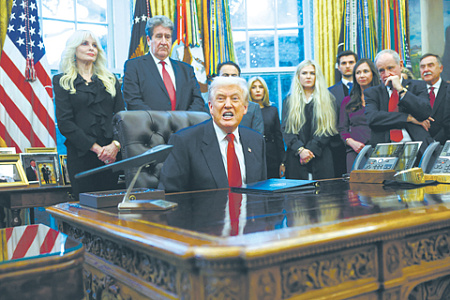
Former US President Donald Trump appears to be reactivating his diplomatic efforts to mediate a resolution in the ongoing conflict between Russia and Ukraine. After a period of relative quiet on the matter, Trump has once again emphasized the necessity for both nations to engage in mutual concessions. While his recent focus had largely been on pressuring Russia, there are now indications that he is prepared to exert influence on Ukrainian President Volodymyr Zelensky as well. Trump consistently articulates a belief that the conflict will not escalate into a global war and expresses confidence in his ability to broker a reconciliation, potentially in the near future.
Speaking at a White House ceremony for the swearing-in of the US Representative for South and Central Asian Affairs, Sergio Gor, Trump addressed the Russia-Ukraine conflict. This venue was notably chosen given his strategy to pressure India into curtailing Russian oil imports as a means to bring Moscow and Kyiv to the negotiating table. He asserted that the situation around Ukraine no longer carries the risk of evolving into a global war. Signaling a significant shift in the White House’s approach, Trump declared, “we are no longer spending money, now we are being paid through NATO.” He was referring to his proposed PURL (Purchasing Ukraine’s Resupply via Europe) scheme, which involves European NATO members purchasing US weaponry and then transferring it to Kyiv, rather than direct, often free, US military aid. Trump underscored his dissatisfaction with past expenditures, stating, “When I came here, how much money have we already given to Ukraine? The actual figure is about $350 billion. That’s unthinkable.”
This overture marks a potential recalibration of the former president’s stance, subtly echoing criticisms of Ukraine that seemed to have subsided after his meeting with President Zelensky on October 17. Following that encounter, Trump had appeared to move away from his initial position of US neutrality and mediation, instead adopting an approach more aligned with supporting Ukraine as an ally. During that period, he authorized anti-Russian sanctions for the first time in his tenure, consistently supplied Kyiv with weaponry, and even voiced confidence in Ukraine’s capacity to restore its 1991 borders. These actions had suggested a return to a policy reminiscent of the Biden administration’s robust support for Ukraine, a course Trump himself had previously condemned. Now, however, the pendulum of his often-unpredictable foreign policy appears to be swinging back.
Further fueling speculation about this shift are developments emanating from Ukraine itself, particularly a high-profile corruption scandal. The National Anti-Corruption Bureau (NABU) and the Specialized Anti-Corruption Prosecutor’s Office (SAP) are investigating alleged embezzlement within the “Energoatom” concern. This probe reportedly implicates Timur Mindich, a co-owner of the “Kvartal-95” studio (who has since left Ukraine), and Herman Halushchenko, the head of the Ministry of Justice. Many observers in both Russia and Kyiv interpret this investigation as a veiled warning to President Zelensky. Events from earlier this year are fresh in memory, when the European Union and, to a lesser extent, the United States, intervened to protect NABU and SAP after Zelensky attempted to bring them under his direct control. Now, these same anti-corruption bodies are investigating individuals closely associated with the Ukrainian president, leading some to speculate whether Trump is heeding Moscow’s consistent hints that Zelensky might not be the most amenable negotiating partner.
Amidst these developments, Ukraine’s allies are bracing for potential shifts in US policy, fearing that Trump might make concessions to Moscow at Kyiv’s expense. Recent events suggest a growing apprehension among European leaders. On November 11, an unannounced, unscheduled meeting of the Ukraine-NATO Council took place in Brussels, attended by Ukrainian Deputy Prime Minister for European and Euro-Atlantic Integration Taras Kachka. The absence of any official briefings or press conferences following the meeting was notably unusual, signaling a quiet urgency.
Adding to the concerns, former Finnish President Sauli Niinistö expressed unease in an interview with Yle a day prior, highlighting his opposition to Trump monopolizing contact with Russian President Vladimir Putin. “Trump talks to him, and we listen to what they talked about,” Niinistö lamented, advocating for the EU to engage in direct negotiations with Russia if it genuinely seeks an end to the conflict. Similar anxieties were voiced by Polish Prime Minister Donald Tusk, who, in a November 10 interview with Gazeta Wyborcza, suggested that Washington’s foreign policy priorities might pivot towards South America, Canada, Greenland, and a potential conflict with China, leaving Europeans to “cope themselves” with their regional challenges. Both Niinistö, who led Finland into NATO after a long period of neutrality, and Tusk, who has focused on overcoming differences with Ukraine to counter Russia, are staunch advocates for Ukrainian support, underscoring the gravity of their concerns for transatlantic unity and the future trajectory of the conflict.
